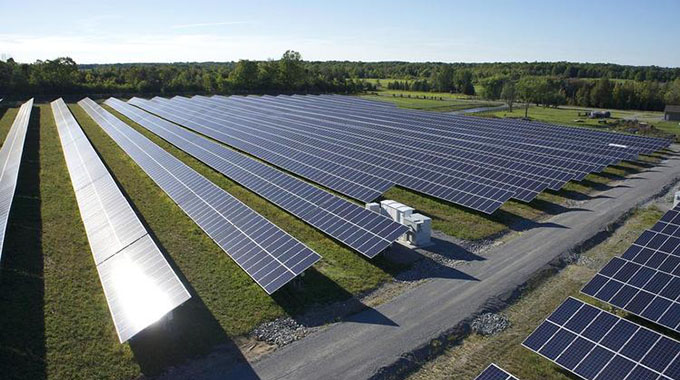EDITORIAL COMMENT:Let’s make solar energy the alternative

Solar energy has been discussed and its benefits extolled for over three decades.
However, the current challenges facing Zesa Holdings call for an aggressive nationwide approach to promote the use of such energy.
While the construction of additional hydro and thermal power stations is being pursued, this is long-term and costly.
This trend and 18-hour long power outages are unlikely to relent, thus increasing the arguments favouring rapid mass adoption of solar energy.
ZESA put up its tariffs by more than 200 percent. This increase is likely to expose vulnerable sections of society, which because of their circumstances, will find themselves unable to shoulder such increases.
The tariffs are never likely to come down.
While Zimbabwe has removed import duties on solar energy-related products, from batteries to cables, and mandated that all new construction in the country include solar systems, the prices of solar panels, batteries and other accessories have remained high.
They are inaccessible to the poor who are trying to shift to renewable energies given the rolling out of power blackouts by ZESA.
The thinking was that after the Government removed duty on solar products this would bring down prices and make them widely accessible to the majority of the people in the country.
Prices of most home solar systems have actually increased from $25 000 (US$2 500) to around $45 000 (US$4 500) or more for a full home solar system installation.
There is clearly rampant profiteering by dealers, who are taking advantage of the energy crisis.
Zimbabwe is fortunate to be located within the tropics. The country experiences just more than eight sun hours a day, rendering it most suitable for exploiting solar energy.
The country’s geographical location means it does not experience severe and sudden drops in temperatures resulting in cases of hypothermia, a medical emergency that occurs when your body loses heat faster than it can produce heat, causing a dangerously low body temperature.
Normal body temperature is around 98.6 F (37°C), and hypothermia occurs as your body temperature falls below 95 F (35°C).
Examples of this include cold exposure.
The recent tariff increases could condemn many old age and pensioners to that condition in the event there was a sudden fall in temperatures and the vulnerable members of society with limited resources find ZESA tariffs a burden.
It is about time the cross over to solar energy is marketed aggressively because that is the future of energy supplies.
It is cleaner energy compared to other fuel based sources. Solar energy is a once-off investment, and in the long run costs less.
Solar has the potential to light up every home, every school — rural or urban, without the attendant power outages the nation is experiencing.
We cannot continue to rely on hydro and thermal power supplies.
But most providers quote in foreign currency, United States dollars to be specific, but it puts a barrier between those wishing to switch over to, and affordability of solar energy.
So, while removing import duty is one commendable step as it reduces the cost of the units landed in Zimbabwe, there should be a parallel, but rapid process that seeks to scale up local production of solar systems.
The advantages are manifold: improved technologies, developing climate adaptable systems specific to local conditions, new frontiers for employment creation, savings on imports, local back-up and affordable solar systems.
While there is willingness to pay value for money, especially given the challenges consumers are encountering over supplies from ZESA, there is an urgent need to identify and address current barriers to accessing solar energy by the majority of Zimbabweans.
This relates to the cost of solar systems, maintenance and post-installation back up service.
But rapid deployment of solar energy need not be dependent on imports alone.
This is why diversification by a local mobile telecommunications giant should be welcomed.
The belief is that locally developed advanced technologies will have readily available back up service.
A scenario such as that witnessed during the 1980s where there was apparent “growth” numerically in the sector followed by stagnation and almost collapse would be unhelpful to the market.
Businesses in the sector need to think long-term and in addition explore financing options through linkages with banks to provide financing.
This will put solar systems within reach of the majority.
Solar technology has been discussed and debated since the second half of the first decade of Independence, with the likes of Dr Gibson Mandishona arguing that biogas should be promoted in tandem with solar.
Let 2020 be the watershed year in crossing over to solar energy and any other cleaner sources of energy.








Comments